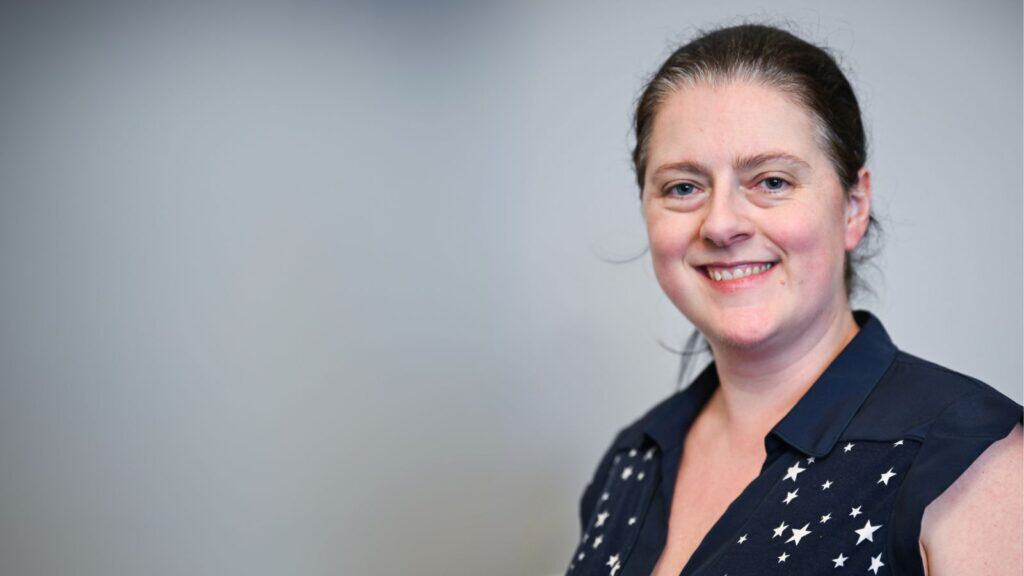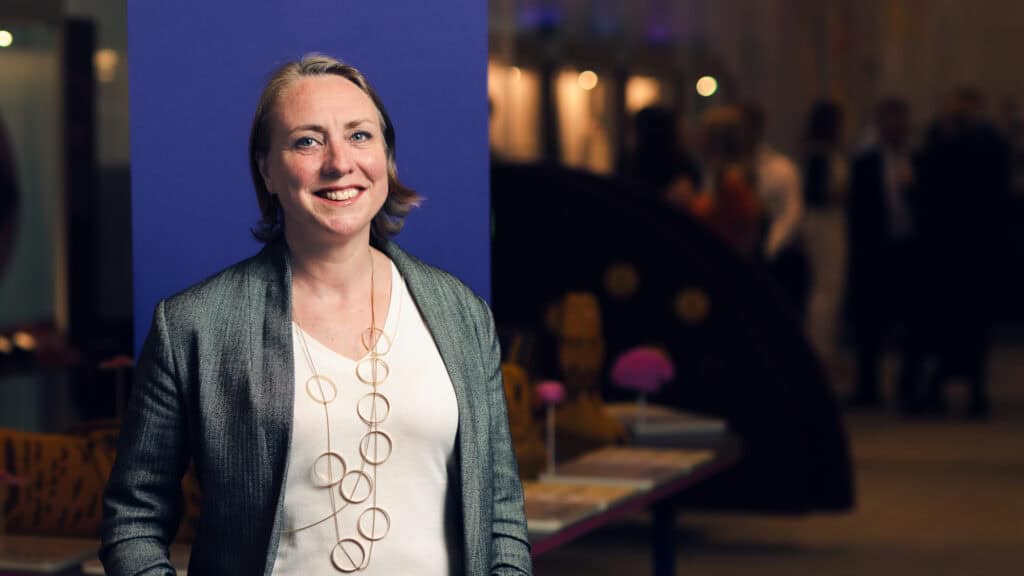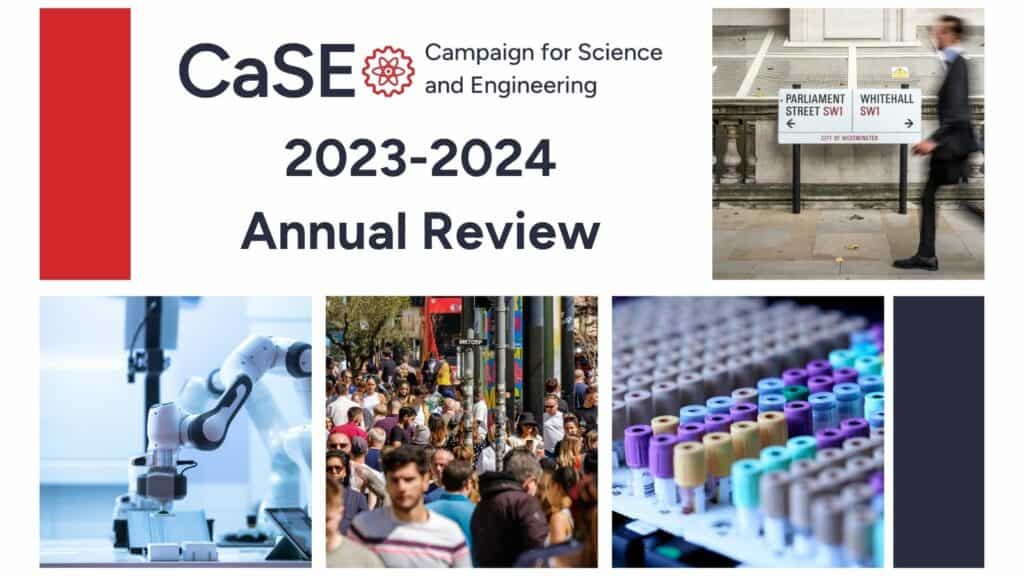Executive Director Dr Sarah Main gives her report on CaSE’s activities and successes at the 2020 online AGM on 25th November.
CaSE in 2020 – A year of challenges and opportunities
07 Dec 2020
Thank you so much for joining us.
My task is to offer you some reflections on the year; what CaSE has been doing and the environment in which we have done it.
I clearly remember starting 2020 with an unusual degree of optimism and a spring in my step. ‘This,’ I thought, ‘is going to be a good year’.
I say this to acknowledge, as Stephen Hawking advised, when we think things are going to happen and they don’t, as often as when we think things are going to happen and they do.
We have all faced challenges this year, but I suspect this will be considered an annus horribilis for many – particularly those who have suffered personal loss and a new depth of isolation as a result of the coronavirus pandemic.
And so it seems to me that science and engineering have become a much more personal aspect of people’s lives. From the pace of engineering ingenuity to create new ventilators, the casual conversations about epidemiology’s ‘r’ values, and the nature of the scientific process itself; this is a year when science has moved from the lab to the living room.
Rather than feeling a warm glow from that spotlight, I think we should acknowledge the responsibility and scrutiny that spotlight brings, and the visceral connection of research and innovation to people’s hopes and fears.
I will admit to being stopped short the first time I heard the Prime Minister use the phrase, ‘we’re following the science’. ‘That’s not how it works,’ I thought. We have now all had our own personal experience of ‘how it works’. As well as what I hope is now a much clearer distinction between scientific advice and political decision-making, we have seen this year the vital and rich contribution of the full range of social, economic and political skills that are required, in complement to science and engineering, to address any major challenge and bring innovative solutions to public use and acceptance. The pandemic response has been a demonstrator of multidisciplinarity, if ever there was one.
And so to my reflections on CaSE’s work this year.
In response to the coronavirus pandemic, we chose to speak for the value of the whole, rich, and interconnected ecosystem for UK research and innovation. At a time when Government has set out ambitious goals for growing research and innovation activity in the UK, parts of the R&D system have been hit hard by the shockwaves of coronavirus. Some R&D-led industries have suffered a collapse in demand or difficult market conditions, such as aerospace, automotive and the energy sector. R&D in other areas seems to have held up well. I have written to the Chair of the House of Commons Science and Technology Committee, Greg Clark, this week to ask the committee to assess the dynamics in the research ecosystem and how Government can set favourable conditions for it to grow and to help drive a health and economic recovery.
CaSE’s work this year has been channeled towards supporting an R&D decade, in which research and innovation grow to become a much more significant part of the UK’s economy and society. The Spending Review announcements today make a significant step towards the Government’s goals of £22bn of public money invested in research and innovation by 2024 and a cross-economy level of investment of 2.4% of GDP by 2027. CaSE has worked closely with HM Treasury, BEIS and UKRI over this year, and previously, to make the case for the value of increased public investment in research and innovation.
Critical to making the case at this Spending Review and the next is the extent to which R&D investment decisions can help achieve Government’s national goals, such as the levelling up agenda. With its breadth of membership across the UK, CaSE was well-placed to gather evidence on the impact of R&D investment in local economies, resulting in our report, The Power of Place. I was pleased to see the language of CaSE’s resulting ‘place’ report reflected closely in the Government’s R&D roadmap. Indeed, today I spoke to Treasury about the Spending Review announcements. We discussed how R&D could contribute to the levelling up agenda, and I referenced evidence gathered in CaSE’s ‘place’ report and our work in highlighting the potential of the Shared Prosperity Fund (the successor to EU structural funds) to build R&D capability across the UK.
Throughout this year, CaSE has been active in discussions about the UK’s future R&D relationship with Europe through our membership of the Science Minister’s senior stakeholder group; through our support in evidence-gathering for the Smith/Reid review on alternatives to Horizon Europe association; and through developing a new relationship with the UK Mission to the EU in Brussels. CaSE has continued to work closely with the sector and Government to secure changes to immigration policy to better attract global talent as the new immigration system comes into place.
I am particularly pleased that, amongst all this activity, CaSE has developed a new strand of work in collaboration with the Wellcome Trust. This work is built on the premise that we need to build a broader and more active base of public support for R&D investment in order to sustain the R&D decade. Over the last year, we have laid the foundations, publishing a report by Public First that takes a baseline of public opinion on research investment and makes recommendations on approaches to public advocacy, drawing on campaign styles from a wide range of interests across the economy and society.
I was struck that Ottoline Leyser, in her answers to questions at the CaSE annual lecture, said that her hope in five years time was that if she asked a person in the street what they thought about research investment, they would say, ‘yes, absolutely!’ I hope that CaSE’s work on building public support for research investment will take us a few steps nearer to that goal.
And speaking of annual lectures, we have had two great lectures this year. The first was Patrick Vallance’s lecture in January, which was postponed from November 2019 due to the General Election, in which he spoke on the subject of embedding research in the heart of Government. The lecture was held at the fantastic lecture theatre at the Crick Institute. By contrast our 2020 annual lecture was given by the new Chief Executive of UKRI, Ottoline Leyser, on an online platform to one of our biggest ever lecture audiences. Her vision of how the research and innovation system can fuel an inclusive knowledge economy was powerful and well received.
I will share with you some brief numbers on our engagement activities over the year. CaSE have held 120 one-to-one meetings with members, politicians, officials, and the wider sector. And we have received over 35 mentions in the media, including BBC News, The Financial Times, and The Guardian.
I would like to take the opportunity to thank you, the members of CaSE, for your support in informing, amplifying and making possible our work. I would like to thank the board of trustees and its Chair, Graeme Reid, for their encouragement and direction over the year. And, in particular, I would like to thank the small but perfectly formed team at CaSE for all they have done to make this work happen.
The 2020 AGM also included the appointment of a new Chair and new trustees to the Board.
Related resources

Lynne Milford reflects on her time as CaSE’s Campaigns and Public Affairs Manager.

Executive Director Dr Alicia Greated gives her report on CaSE’s activities and successes at the 2024 AGM on November 26th.

This year has seen changes to CaSE as an organisation, shifts in the UK political landscape, and important developments for the UK R&D sector.

A General Election year presents a real opportunity for the R&D sector to make our voices heard.